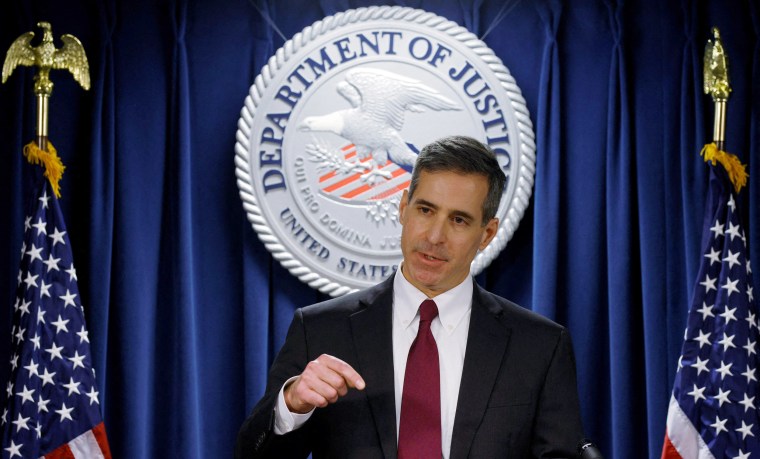The Kremlin-linked Russian businessman who appeared in federal court Monday on insider trading and computer hacking charges had previously spurned approaches by U.S. and British intelligence agencies while traveling in Europe, his lawyer told NBC News.
The revelation underscores the national security implications of a case that a top federal prosecutor celebrated this week as a big victory for the U.S. U.S. officials described the businessman, Vladislav Klyushin, as being close to Russian President Vladimir Putin, and one of his co-defendants in the insider trading case has also been charged with 2016 election hacking.
“He was perceived by U.S. intelligence as someone who may have confidential information or state secrets,” said Oliver Ciric, who represented Klyushin in a bid to keep the Swiss government from extraditing him to the U.S.
Some of the charges carry maximum terms of 20 years in prison — a possibility that appears to hand U.S. intelligence agencies considerable leverage.
Klyushin was arrested when he flew in a private jet with his family to Switzerland for a ski vacation in March and was held there until he was flown to Boston over the weekend.
Ciric said his argument to Swiss judges In his unsuccessful bid to stop the extradition was that “this is not a simple case of insider trading — the insider trading charges are disingenuous.”
He added, “It’s not a secret that his company had a series of government contracts in Russia, including with some of the national intelligence agencies.”
Ultimately, the Swiss courts approved extradition to the U.S. while rejecting a Russian extradition request for Klyushin, the details of which have not been made public.
The FBI and the CIA declined to comment. A U.S. lawyer for Klyushin, Max Nemtsev, did not respond to a request for comment.
Klyushin owns M13, a Russian company that offers media monitoring and cybersecurity services. The federal charges unsealed Monday and a related complaint by the Securities and Exchange Commission accuse him of participating in an illegal scheme that reaped more than $82 million by trading U.S. stocks on inside information gleaned from hacking.
Klyushin and his co-defendants “hacked U.S networks, stole inside information and cheated honest investors out of millions of dollars,” acting U.S. Attorney Nathaniel Mendell of Massachusetts told reporters Monday.

Mendell noted that the case has a connection to the 2016 hack of the Democratic National Committee by Russia. One of Klyushin’s co-defendants — Ivan Ermakov — was among the 12 alleged Russian intelligence operatives charged in the U.S. over the hacking.
In October 2018, Ermakov was also charged in federal court in Pittsburgh in connection with allegations that he played a role in hacking and related disinformation operations attributed to the Russian government that targeted international anti-doping agencies, sporting federations and anti-doping officials.
The SEC complaint says Ermakov hacked into the networks of firms that file SEC documents on behalf of public companies, “for the purpose of accessing and downloading corporate earnings announcements and then providing that information to other individuals to profitably trade securities based upon the hacked earnings announcements.” Among the stocks they traded was that of automaker Tesla, court documents say.
Nothing in the documents accuses Klyushin of participating in the election hacking or any other Russian government operation. But given his position, he is likely to be privy to many Russian intelligence secrets, said NBC News contributor Frank Figliuzzi, a former chief of counterintelligence for the FBI.
“There’s likely more than meets the eye to this indictment and extradition,” Figliuzzi said. “Time will expose how valuable this individual could be to the U.S. intelligence community.
“The government appears to have a solid case against him,” Figliuzzi said, “and because of his potential knowledge of Russian intelligence operations, he is going to need to give serious consideration to cooperating and giving up what he knows.”
Ciric, the Swiss attorney, said he fully expects the U.S. government to press his client to cooperate. He said his family, including five young children, returned to Moscow shortly after he was arrested — which could complicate any arrangement he may want to make with the Americans.
Ciric said two Americans who Klyushin assumed worked for U.S. intelligence agencies approached him in a bar in the south of France last summer. One or both spoke Russian, and after a polite conversation Klyushin made it clear that he was not open to recruitment, he told his lawyer.
Another similar attempt by British agents happened in 2019 while Klyushin was vacationing in Edinburgh, Scotland, Ciric said.
Klyushin’s travels through Europe suggest he didn’t believe he had anything to fear by jetting off to the Swiss Alps.
After Klyushin was arrested in Switzerland in March, Ciric fought the extradition by arguing that the case was political and revolved around the U.S.’s wanting to grill his client about Russian secrets. As part of the case, he requested and obtained documents from the Swiss government showing that Swiss intelligence maintained several files on Klyushin, including one in an intelligence database designed to be shared with foreign governments, he said.
“It shows that this is not about a simple insider trading case,” Ciric said.
